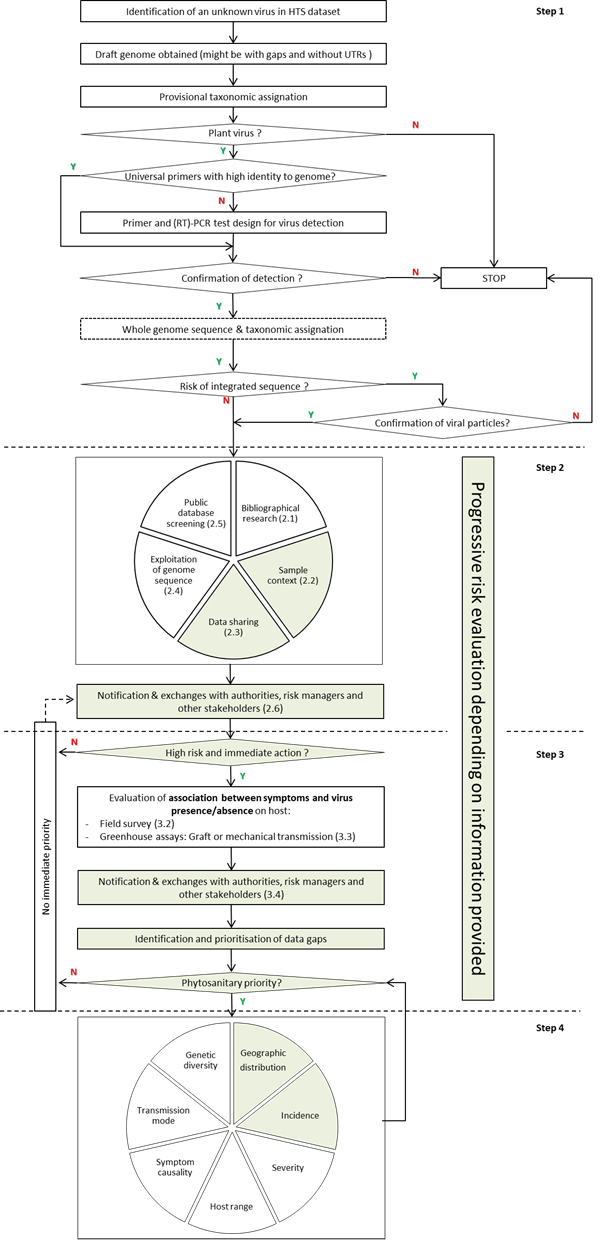Managing the deluge of newly discovered plant viruses and viroids: an optimized scientific and regulatory framework for their characterization and risk analysis
Nuria Fontdevila Pareta, Maryam Khalili, Ayoub Maachi, Mark Paul S. Rivarez, Johan Rollin, Ferran Salavert8, Coline Temple, Miguel A. Aranda, Neil Boonham8, Marleen Botermans, Thierry Candresse, Adrian Fox, Yolanda Hernando, Denis Kutnjak, Armelle Marais, Françoise Petter, Maja Ravnikar, Ilhem Selmi, Rachid Tahzima, Charlotte Trontin, Thierry Wetzel and Sebastien Massart. DOI 10.3389/fmicb.2023.1181562 The advances in high-throughput sequencing (HTS) technologies and bioinformatic tools have provided new opportunities for virus and viroid discovery and diagnostics. Hence, new sequences of viral origin are being discovered and published at a previously unseen rate. Therefore, a collective effort was undertaken to write and propose a framework for prioritizing the biological characterization steps needed after discovering a new plant virus to evaluate its impact at different levels.
- 24 July 2023
- Yolanda Hernando Saiz
- < back to blog index
The advances in high-throughput sequencing (HTS) technologies and bioinformatic tools have provided new opportunities for virus and viroid discovery and diagnostics. Hence, new sequences of viral origin are being discovered and published at a previously unseen rate. Therefore, a collective effort was undertaken to write and propose a framework for prioritizing the biological characterization steps needed after discovering a new plant virus to evaluate its impact at different levels. Even though the proposed approach was widely used, a revision of these guidelines was prepared to consider virus discovery and characterization trends and integrate novel approaches and tools recently published or under development. This updated framework is more adapted to the current rate of virus discovery and provides an improved prioritization for filling knowledge and data gaps. It consists of four distinct steps adapted to include a multi-stakeholder feedback loop. Key improvements include better prioritization and organization of the various steps, earlier data sharing among researchers and involved stakeholders, public database screening, and exploitation of genomic information to predict biological properties

< back to blog index
Recent posts
- Carrot populations in France and Spain host a complex virome rich in previously uncharacterized viruses
- VIROME ANALYSIS OF IRRIGATION WATER SOURCES PROVIDES EXTENSIVE INSIGHTS INTO THE DIVERSITY AND DISTRIBUTION OF PLANT VIRUSES IN AGROECOSYSTEMS
- Round table: https://youtu.be/XPYOCrXqqOQ
- Managing the deluge of newly discovered plant viruses and viroids: an optimized scientific and regulatory framework for their characterization and risk analysis
- A new flavi-like virus identified in populations of wild carrot
- Tomato brown rugose fruit virus in aqueous environments – survival and significance of water-mediated transmission
- First report of carrot torrado virus 1 (CaTV1) naturally infecting carrots in Spain
- VirHunter: A Deep Learning-Based Method for Detection of Novel RNA Viruses in Plant Sequencing Data
- Diversity of polerovirus-associated RNAs in the virome of wild carrots
- First report of Apium virus Y in wild carrot (Daucus carota ssp. carota) in Spain
- Tobamoviruses show broad host ranges and little genetic diversity among four habitat types of a heterogeneous ecosystem.
- Metagenomics show high spatiotemporal virus diversity and ecological compartmentalisation: virus infections of melon, Cucumis melo, crops and adjacent wild communities
- Web-based roundtable: Adoption and impact of high throughput sequencing in plant health: Seed testing, surveillance and certification
- Identification of two novel putative satellite RNAs with hammerhead structures in the virome of French and Spanish carrot samples
- Diversity and pathobiology of an Ilarvirus unexpectedly detected in diverse plants and global sequencing data
- First Report of Ranunculus White Mottle Ophiovirus in Slovenia in Pepper with Yellow Leaf Curling Symptom and in Tomato
- In-depth study of tomato and weed viromes reveals undiscovered plant virus diversity in an agroecosystem
- THE EXPANDING MENAGERIE OF PRUNUS-INFECTING LUTEOVIRUSES
- Molecular characterization of a new Prunus-infecting cheravirus and complete genome sequence of stocky prune virus
- Genetic differentiation and migration fluxes of viruses from melon crops and crop edge weeds
- Global advances in tomato virome research: current status and the impact of high-throughput sequencing
- Cont-ID: Detection of samples cross-contamination in viral metagenomic data
- Validation of high throughput sequencing as virus indexing test for Musa germplasm: performance criteria evaluation and contamination monitoring using an alien control
- HIGH THROUGHPUT SEQUENCING TECHNOLOGIES COMPLEMENTED BY GROWER’S PERCEPTION HIGHLIGHT THE IMPACT OF TOMATO VIROME IN DIVERSIFIED VEGETABLE FARMS
- BIOLOGICAL AND GENETIC CHARACTERIZATION OF PHYSOSTEGIA CHLOROTIC MOTTLE VIRUS IN EUROPE BASED ON HOST RANGE, LOCATION, AND TIME
- Risk perception associated with an emerging agri-food risk in Europe: plant viruses in agriculture
- First reports of Apple luteovirus 1, Apple rubodvirus 1 and Apple hammerhead viroid infecting apples in Belgium
- Evaluation of Methods and Processing for Robust Monitoring of SARS-CoV-2 in Wastewater
- Importance of associated weeds and cropping systems in shaping the viromes of horticultural crops. Ayoub Maachi PhD Thesis
- Use of high throughput sequencing and two RNA input methods to identify viruses infecting tomato crops.
- Complete genome sequence of malva-associated soymovirus 1: a novel virus infecting common mallow
- Cohombrillo-associated virus: a novel virus infecting Ecballium elaterium plants
- Known and new viruses identified in the virome of crops scanned by INEXTVIR
- Scanning the virome of Prunus : Identification and characterization of novel luteoviruses and Secoviridae members
- Complete genome sequence of almond luteovirus 1, a novel luteovirus species infecting almond
- INEXTVIR Mid-Term Check + Network Meeting 2 + School 2